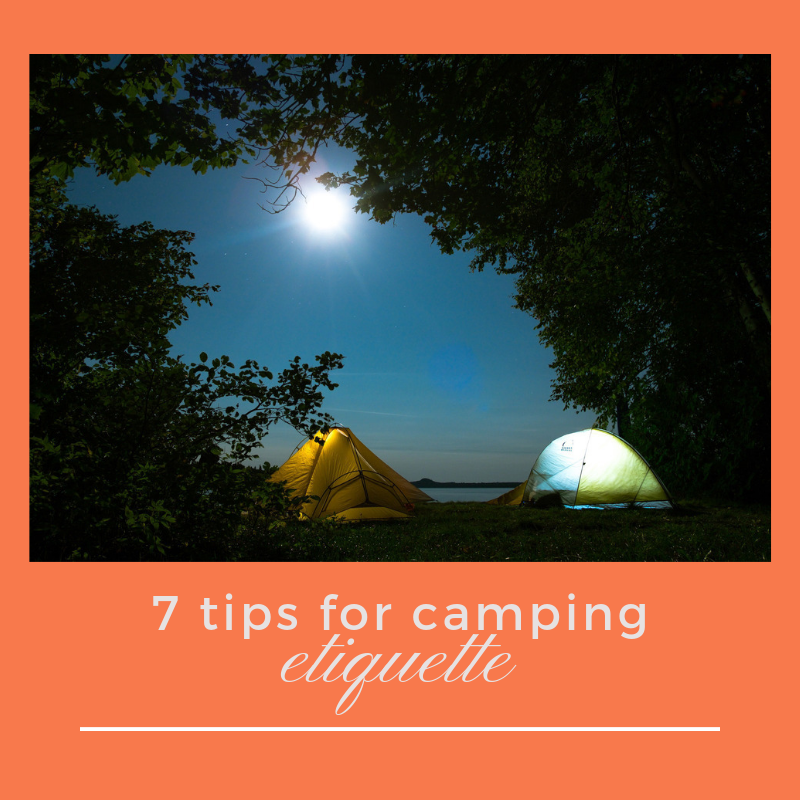"Thousands of tired, nerve-shaken, over-civilized people are beginning to find out that going to the mountains is going home; that wildness is a necessity; and that mountain parks and reservations are useful not only as fountains of timber and irrigating rivers, but as fountains of life." -John Muir
Thanks John! So you're telling me that people who've never been in the wilderness before are poppin' up their tents and treating it like their homes?
Ugh! My kids tear up my home! I terrorized my neighbors in college by blaring the music until 2am most nights!
Maybe this is coming off a bit harsh. I really am excited to share nature with others. Let's just get a few ground rules out there so we can all treat nature and our fellow campers right.
1. Campsite Property
You put a whopping $5.00 (or more!) to rent your campsite for the night. This means it's technically your property to take care of for the time you're there. The same goes for your neighbor too. We all should take our garbage to the dumpster regularly and pick up after meals. I've seen lunches and empty baggies left on picnic tables which encourages fauna like squirrels and flies to congregate. Nobody wants to camp next to a neighboring fly party. Yuck! That trash is also called "litter" when it blows away.
We should also stay off other campers' site property. Walk on the path, even if the route to the bathroom is shorter by cutting through just one campsite. I'm sure an exception applies here If you're on the verge of peeing your pants (or something worse).
2. Trees
Always use the firewood offered or sold at your campground. This reduces the threat of introducing invasive species from another area.
If you put up tarps, clotheslines, or hammocks at your campsite, be careful where you hang them. Don't bend the tree trunk or branches with your ropes and never put nails or spikes into the tree to hang stuff.
Pulling sticks off a tree for roasting sticks can harm the tree as well. Collect roasting sticks from the ground.
3. The Campfire
Wood only please. It might make sense throw paper goods into the fire. Who doesn't want to reduce their amount of waste? But household items, like paper plates, emit dangerous smoke (carbon emissions) when they're burned. The most eco-friendly option is to use reusable dishes. Personally, I use paper plates and throw them out.
Fire safety - keep a bucket of water and a shovel next to your campfire in case an ember escapes from the ring. The last man standing at the fire is responsible for putting the fire out (no matter how many beers he's had).
4. Dishes
The etiquette of doing the dishes when camping is different from our modern home life. News flash: sinks and disposals are not included.
Scrape all of your extra food off into a bag. True story - I've watched families rinse out their remaining spaghetti sauce and noodles at the community water spigot. Not only was this seriously disgusting, but it attracted wildlife to our campground.
Don't dump the dishwater in lakes or streams. When you're done with the dishes, dump your water in the designated spot. You can always ask the camp host where this is located.
5. Noise
I don't care if it's Eminem, Whitney Houston or Garth Brooks. I can't hear the damn birds with your music cranked up that loud! Music should never be played too loud no matter what time of day. It should always be off by quiet hours (usually 10pm to 6am).
Another fun fact is that noise travels in campgrounds especially if you are by a stream or in the quiet of the night. Remember that your tent is not made of walls and people can hear everything you do in them clearly.
6. Driving
Keep your driving painfully slow. Speed limits are usually set at 5mph. The speed limit is super low to keep kids and other campers safe from traffic and it reduces the amount of dust kicked up from the car.
If you come into the campground late, dim your headlights and keep your voice low. It's exciting after a long day to finally reach your destination but you should always be thinking of others. You never know if you'll need to borrow a can opener!
7. Showers
Keep your showers short (think under five minutes). Be mindful that other campers are waiting to take their showers too. If you don't have to take shower during peak hours, go in the middle of the day.
Pro tip: bring a pair of flip flops for the shower. Although I don't pee on the shower floor, I'm not certain that everyone else does the same.
To sum it all up, be kind and thoughtful of other people and of nature. Start educating yourself as well. Even little things like always purchasing your firewood at the campsite you're at can make a huge difference.
